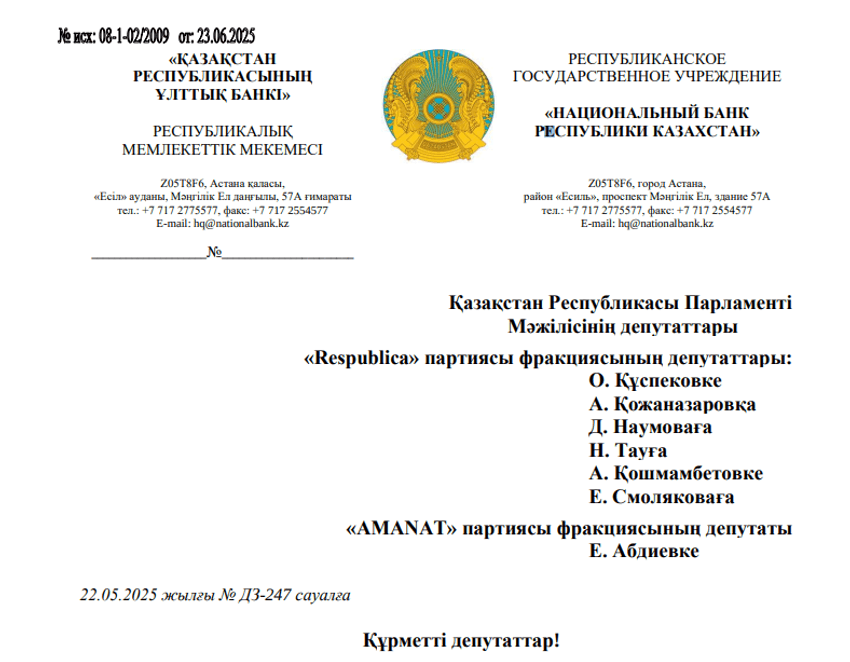Kazakhstan Moves Toward State-Backed Crypto Fund
Kazakhstan is officially planning to establish a national cryptocurrency reserve, marking its most ambitious step yet in embracing blockchain finance. The initiative will likely be funded through seized digital assets and proceeds from state-managed crypto mining, according to a report published by Kazinform on July 1.
The National Bank of Kazakhstan confirmed its support for the reserve in a formal response to Parliament dated May 22. The bank's chairman, Timur Suleimenov, acknowledged the risks and volatility associated with digital assets but emphasized that central oversight would allow for stronger risk management and regulatory clarity.
The crypto reserve is expected to be managed by a specialized subsidiary of the National Bank focused on alternative investments. This signals a desire to institutionalize crypto exposure while keeping it within state-controlled channels.

Source: Mazhilis of the Parliament of the Republic of Kazakhstan
Combining Innovation With Control
While Kazakhstan continues to experiment with blockchain technologies, it's also tightening its grip on oversight. Suleimenov noted that having crypto reserves under a centralized entity would help align with international practices and prevent misuse, especially given crypto’s notorious role in illicit financial flows.
This is consistent with recent actions by Kazakh regulators. In 2024, authorities cracked down on 36 illegal crypto exchanges, citing concerns over money laundering and weak compliance. At the same time, the government has been actively developing crypto-friendly environments - creating a dual-track approach of enforcement and innovation.
“CryptoCity” and the Bigger Picture
The crypto reserve is just one piece of Kazakhstan’s larger digital asset push. In May, President Kassym-Jomart Tokayev announced plans for “CryptoCity,” a pilot zone where citizens and businesses will be able to pay for goods and services using cryptocurrencies.
Kanysh Tuleushin, the country’s first vice minister of digital development, reinforced this vision by stating that Kazakhstan is positioning itself to become the leading crypto hub in Central Asia, provided regulation becomes more adaptive and friendly to innovation.
This reflects a growing realization among Kazakh leaders that crypto adoption can coexist with regulatory order - especially if the state plays an active, strategic role.
Joining a Global Trend of State Crypto Reserves
Kazakhstan is not alone in exploring national crypto reserves. Just last week, India’s BJP spokesperson Pradeep Bhandari called for a Bitcoin reserve pilot. Meanwhile, in the US, Texas Governor Greg Abbott recently signed legislation to establish a Strategic Bitcoin Reserve in the Lone Star State.
Senator Cynthia Lummis has also claimed that some divisions within the US military support the creation of a Bitcoin reserve to counter economic warfare threats. The idea of government-backed crypto holdings is evolving from fringe theory to mainstream policy, especially in the context of rising global financial tensions and de-dollarization efforts.
Kazakhstan’s Play for Strategic Digital Power
If successful, Kazakhstan’s crypto reserve would not only signal its seriousness about blockchain adoption, but also position the country to benefit from digital asset appreciation, diversify its reserves, and build economic resilience.
This move could also attract global blockchain talent and institutional investors, especially if combined with CryptoCity’s commercial opportunities. In short, Kazakhstan may soon emerge as one of the most strategically positioned crypto nations in Eurasia—combining energy access, regulation, and now, sovereign crypto exposure.



